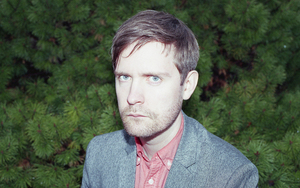Sustaining Creativity with Justin Runge
/Justin Runge lives in Lawrence, Kansas, where he serves as poetry editor of Parcel. He is the author of two chapbooks, Plainsight (New Michigan Press, 2012) and Hum Decode (Greying Ghost Press, 2014). Runge's poem, "Song For Pilgrims" was published by the Roanoke Review. His work appears or is forthcoming in Best New Poets, Cincinnati Review, Poetry Northwest, DIAGRAM, and elsewhere. He can be found at www.justinrunge.me. Steph Spector speaks with Justin below.
Describe an average day in the life of Justin Runge.
I suppose, mathematically, the average day for all of us is a weekday, right? Mine look like this: I wake up, catch the bus, and spend my day behind a desk at the University of Kansas, where I work in marketing. Then I catch the bus back home and spend the evening with my wife doing what married people do: make dinner, watch Netflix, sing to the cat.
In an interview with Best New Poets, you say that you adore Mark Strand. What about him?
I’ve always loved Strand’s distinctive restraint. That simplicity, which belies an immense intelligence, clicks for many young poets who find Strand because they spend so much time trying to complicate their work with the trappings of intelligence, of virtuosity. (I know I did.) Strand’s style was a relief and a challenge to me; I realized the acrobatics weren’t necessary, and that perhaps they were easier than what he was doing.
Tell us about Song for Pilgrims.
Your Strand question is either very coincidental or very intuitive, because “Song for Pilgrim” stems directly from Strand’s last collection, Almost Invisible. I was a bit crestfallen when I saw that Almost Invisible comprised of prose poems solely, because Strand’s sense of the line was so breathtaking. As I dove in, though, I saw that the form was obviously right for the work. That collection pushed me to try prose. As far as background, I was working in Topeka at the time and eating lunch on the grounds of the state capitol— the first draft was written from a bench there.
If you were given unlimited resources to design and complete your ideal writing project, what would you do?
A project I’ve worked on irregularly for over a year involves ekphrastic responses to all of Andrew Wyeth’s Helga pictures — the paintings, the sketches, the studies, everything. (Right now, I’m 30 poems down, with around 200 to go.) So I’d love to be able to spend an unbroken length of time writing those poems in his studio in Chadds Ford, Pennsylvania, with access to as many of the real pieces as possible.
How do you select the literary magazines you submit to?
The obvious reasons: Their previously published work shares similarities or sympathies with my own; the publication itself shows immense care in its design and editing; perhaps I have personal connections with former contributors or current staff. And let’s be honest — a submission fee or mailing rigmarole might lead to me choosing to send elsewhere. (I’ll send to venues that require one or the other, but time and money are resources that are in demand for us all.)
What did you study as an undergraduate at Nebraska Wesleyan? What was the best lesson you learned there?
I studied both English and theatre at Wesleyan, and a few of the biggest lessons, beyond the real work of scholarship, had to do with the nature of my double major — chiefly, creativity takes initiative and endurance, so it’s best to choose one passion and focus for a while. (A juggler may never drop a ball, but fatigue is inevitable.)
What question have you always wanted to be asked as a writer?
I think a question that all new poets have is this: “Do I have to be obsessed or well-read or ambitious to prove I’m a serious poet?” While I think a smidge of all of those qualities can be valuable, none are deal-breakers. And a poet can become too focused on the involvement or reading or publishing. Make sure the work sustains, and then see where that takes you. (Of course, attend a reading, read a book, and send out a poem or two as often as you can without stressing.)


